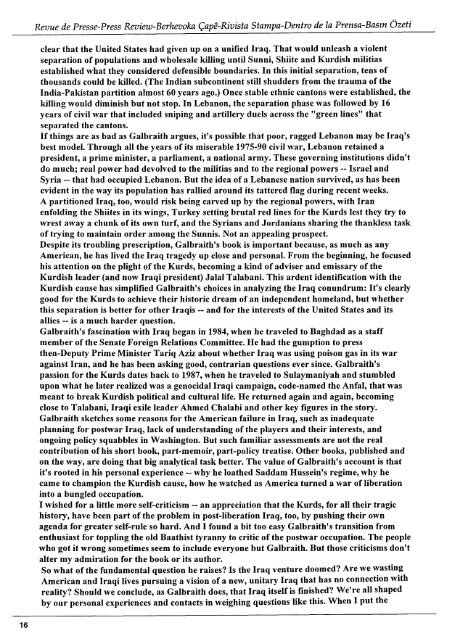Bulletin de liaison et d'information - Institut kurde de Paris
Bulletin de liaison et d'information - Institut kurde de Paris
Bulletin de liaison et d'information - Institut kurde de Paris
Create successful ePaper yourself
Turn your PDF publications into a flip-book with our unique Google optimized e-Paper software.
Revue <strong>de</strong> Presse-Press Review-Berhevoka Çapê-Rivista Stampa-Dentro <strong>de</strong> la Prensa-Basm Oz<strong>et</strong>i<br />
clear that the United States had given up on a unified Iraq. That would unleash a violent<br />
separation of populations and wholesale killing until Sunni, Shiite and Kurdish militias<br />
established what they consi<strong>de</strong>red <strong>de</strong>fensible boundaries. In this initial separation, tens of<br />
thousands could be killed. (The Indian subcontinent still shud<strong>de</strong>rs from the trauma of the<br />
India-Pakistan partition almost 60 years ago.) Once stable <strong>et</strong>hnic cantons were established, the<br />
killing would diminish but not stop. In Lebanon, the separation phase was followed by 16<br />
years of civil war that inclu<strong>de</strong>d sniping and artillery duels across the "green lines" that<br />
separated the cantons.<br />
If things are as bad as Galbraith argues, it's possible that poor, ragged Lebanon may be Iraq's<br />
best mo<strong>de</strong>l. Through all the years of its miserable 1975-90 civil war, Lebanon r<strong>et</strong>ained a<br />
presi<strong>de</strong>nt, a prime minister, a parliament, a national army. These governing institutions didn't<br />
do much; real power had <strong>de</strong>volved to the militias and to the regional powers -- Israel and<br />
Syria -- that had occupied Lebanon. But the i<strong>de</strong>a of a Lebanese nation survived, as has been<br />
evi<strong>de</strong>nt in the way its population has rallied around its tattered flag during recent weeks.<br />
A partitioned Iraq, too, would risk being carved up by the regional powers, with Iran<br />
enfolding the Shiites in its wings, Turkey s<strong>et</strong>ting brutal red lines for the Kurds lest they try to<br />
wrest away a chunk of its own turf, and the Syrians and Jordanians sharing the thankless task<br />
of trying to maintain or<strong>de</strong>r among the Sunnis. Not an appealing prospect.<br />
Despite its troubling prescription, Galbraith's book is important because, as much as any<br />
American, he has lived the Iraq tragedy up close and personal. From the beginning, he focused<br />
his attention on the plight of the Kurds, becoming a kind of adviser and emissary of the<br />
Kurdish lea<strong>de</strong>r (and now Iraqi presi<strong>de</strong>nt) Jalal Talabani. This ar<strong>de</strong>nt i<strong>de</strong>ntification with the<br />
Kurdish cause has simplified Galbraith's choices in analyzing the Iraq conundrum: It's clearly<br />
good for the Kurds to achieve their historic dream of an in<strong>de</strong>pen<strong>de</strong>nt homeland, but wh<strong>et</strong>her<br />
this separation is b<strong>et</strong>ter for other Iraqis -- and for the interests of the United States and its<br />
allies -- is a much har<strong>de</strong>r question.<br />
Galbraith's fascination with Iraq began in 1984, when he traveled to Baghdad as a staff<br />
member of the Senate Foreign Relations Committee. He had the gumption to press<br />
then-Deputy Prime Minister Tariq Aziz about wh<strong>et</strong>her Iraq was using poison gas in its war<br />
against Iran, and he has been asking good, contrarian questions ever since. Galbraith's<br />
passion for the Kurds dates back to 1987, when he traveled to Sulaymaniyah and stumbled<br />
upon what he later realized was a genocidal Iraqi campaign, co<strong>de</strong>-named the Anfal, that was<br />
meant to break Kurdish political and culturallife. He r<strong>et</strong>urned again and again, becoming<br />
close to Talabani, Iraqi exile lea<strong>de</strong>r Ahmed Chalabi and other key figures in the story.<br />
Galbraith sk<strong>et</strong>ches some reasons for the American failure in Iraq, such as ina<strong>de</strong>quate<br />
planning for postwar Iraq, lack of un<strong>de</strong>rstanding of the players and their interests, and<br />
ongoing policy squabbles in Washington. But such familiar assessments are not the real<br />
contribution of his short book, part-memoir, part-policy treatise. Other books, published and<br />
on the way, are doing that big analytical task b<strong>et</strong>ter. The value of Galbraith's account is that<br />
it's rooted in his personal experience -- why he loathed Sadd am Hussein's regime, why he<br />
came to champion the Kurdish cause, how he watched as America turned a war of liberation<br />
into a bungled occupation.<br />
I wished for a little more self-criticism -- an appreciation that the Kurds, for all their tragic<br />
history, have been part of the problem in post-liberation Iraq, too, by pushing their own<br />
agenda for greater self-rule so hard. And I found a bit too easy Galbraith's transition from<br />
enthusiast for toppling the old Baathist tyranny to critic of the postwar occupation. The people<br />
who got it wrong som<strong>et</strong>imes seem to inclu<strong>de</strong> everyone but Galbraith. But those criticisms don't<br />
alter my admiration for the book or its author.<br />
So what of the fundamental question he raises? Is the Iraq venture doomed? Are we wasting<br />
American and Iraqi lives pursuing a vision of a new, unitary Iraq that has no connection with<br />
reality? Should we conclu<strong>de</strong>, as Galbraith does, that Iraq itself is finished? We're all shaped<br />
by our personal experiences and contacts in weighing questions like this. When I put the<br />
16

















